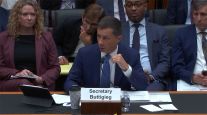Senior Reporter
Federal Funding Bill Tops Election-Year Agenda

[Stay on top of transportation news: Get TTNews in your inbox.]
It was late into 2023 when Rep. Mike Johnson (R-La.) first addressed the U.S. House of Representatives in his new role as Speaker of the House, but in his new job Johnson hit the ground running. Somewhat out of necessity.
Johnson’s October ascension to the post capped a tumultuous stretch where multiple candidates emerged and then fell by the wayside in the race to replace Rep. Kevin McCarthy (R-Calif.) for the top job in the House. The long run-up to his election stalled budget negotiations to keep the federal government running, which put Johnson on the hot seat to advance negotiations that ultimately resulted in a bipartisan short-term funding measure. President Joe Biden signed the stopgap government funding bill.
Although Republicans’ support for the short-term bill split, the speaker managed to wrap up 2023 holding onto a majority of his caucus’ support. And he’ll need it, as the House and Senate will kick off 2024 under pressure to finalize fiscal 2024 appropriations legislation before Jan. 19 and Feb. 2 funding deadlines.
“We’re all-hands-on-deck on the appropriations bills,” Johnson told reporters at the Capitol on Dec. 19. “As we know, we have looming deadlines and we all agreed on that.”
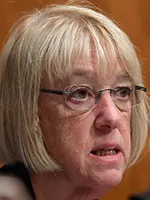
Murray
It is unclear, however, how much Republican support Johnson will manage to keep entering the first full year of his tenure. Several House Republicans are taking aim at programs related to energy policy, environmentally sustainable infrastructure and climate change.
In the Senate, Appropriations Committee Chairwoman Patty Murray (D-Wash.) emphasized a sense of urgency surrounding the funding process. She urged the speaker to expedite negotiations while warning against extending another short-term funding measure through fiscal 2024. “We need to pass full-year spending bills — that’s it. So, I hope the speaker hears me loud and clear,” said Murray on Dec. 12.
Specific to trucking, the House and Senate have agreed on dedicating nearly $1 billion for the Federal Motor Carrier Safety Administration’s operational budget, but have yet to arrive on a final budget bill for the agency. Instead, the agency and the rest of the broader Department of Transportation under which it’s housed is operating under budget authority that expires Jan. 19. For congressional leaders, such as Johnson, budget negotiations will consume their attention for much of January.
IIJA
Since its enactment in 2021, the $1.2 trillion Infrastructure Investment and Jobs Act has provided funding boosts to connectivity projects on local and regional levels.
In 2024, IIJA is expected to continue to anchor Biden’s economic agenda and highway safety goals, due primarily to its vast reservoir of funding. USDOT has kept a pace of announcing new tranches of grants or funding every couple of weeks. For instance, during the recent announcement of $817 million in grants for safe streets projects for regional, local and tribal communities, Transportation Secretary Pete Buttigieg observed, “We are acting to confront the crisis of safety on our nation’s roads, helping communities work to reduce traffic deaths to the only acceptable number: zero.”
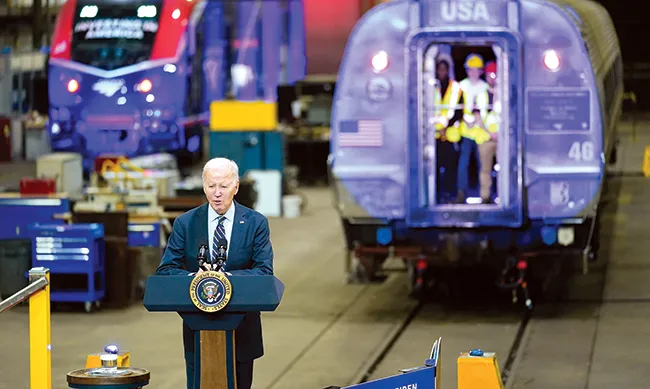
President Joe Biden speaks at the Amtrak Bear Maintenance Facility on Nov. 6 in Bear, Del. (Matt Rourke/AP)
The consistent funding announcements have attracted senior Republicans’ attention. Citing their oversight role of the Biden administration, the House transportation committee has raised concerns with aspects of IIJA’s implementation. Subcommittee on highway policy Chairman Rick Crawford (R-Ark.) explained the party’s viewpoint during a hearing in December: “I will simply reiterate the message from our shared transportation stakeholders: Slow execution of contracts and confusing guidance documents have the very real risk of delaying critical transportation projects, which are necessary to move people and freight safely and efficiently throughout the country.”
“Even though I did not support IIJA,” the chairman continued, “it is the law, and I will ensure the resources provided by Congress are addressing our most pressing transportation, safety, infrastructure and supply chain needs, which I know is a shared, bipartisan goal of all of us.”
WRDA
In 2024, transportation policymakers intend to advance the latest version of a biennial water infrastructure bill, the Water Resources Development Act, which aims to improve connectivity along the nation’s commercial waterways.
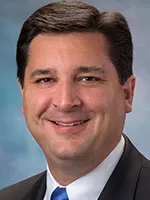
Rouzer
The legislation would approve funding for projects pertaining to ports, dams, waterways, canals and locks. Major projects under the jurisdiction of the Army Corps of Engineers are a priority for congressional policymakers.
Rep. David Rouzer (R-N.C.), chairman of the Water Resources and Environment Subcommittee, and key to crafting the latest WRDA authorization, said in December: “Since 2014, Congress has enacted a WRDA bill every two years with strong bipartisan support. This consistency over the last decade has allowed Congress to respond to local water resource needs more effectively. It also imparts confidence that we can address water infrastructure needs that may arise in the future, regardless of partisan discord in Washington.” WRDA would seek to improve access to ports and harbors as well as inland waterway networks. It would expand resources for flood mitigation and pave the way for additional water resources infrastructure.
Supply Chain
Congressional transportation panels plan to advance legislation meant to enhance safety along rail lines in 2024. Pointing to potential supply chain connectivity benefits, Senate Commerce Committee Chairwoman Maria Cantwell (D-Wash.) indicated she will seek to gain momentum on a bipartisan freight rail safety bill.
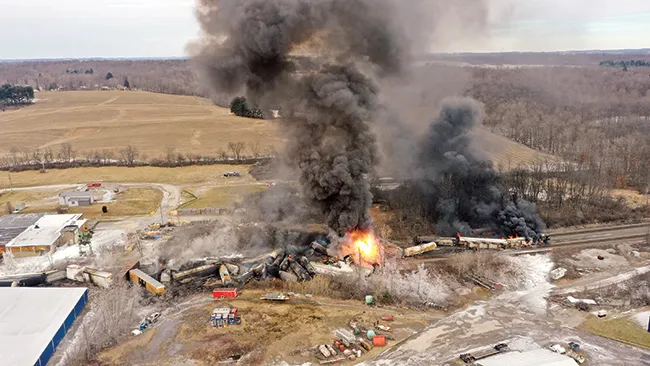
A Norfolk Southern train derailed in East Palestine, Ohio, on Feb. 3, 2023. (Gene J. Puskar/Associated Press)
In a recent resolution endorsed by her colleagues, the chairwoman indicated: “The Feb. 3, 2023, Norfolk Southern train derailment in East Palestine, Ohio, which resulted in the burning of [six] vinyl chloride tank cars and forced the evacuation of approximately 2,000 nearby residents, was a reminder of the risks posed by hazardous materials transportation.”
The Senate committee-passed Railway Safety Act, meant to promote the safe transport of freight along rail lines nationwide, targets policies at the Federal Railroad Administration and the Pipeline and Hazardous Materials Safety Administration. The Senate bill awaits a floor vote. The House version has not advanced out of a committee of jurisdiction.
Elections
In the not-so-distant future, the major political parties are scheduled to formally nominate their candidates for president. Based on polling, former President Donald Trump is a front-runner to lead Republicans. For Democrats, Biden is campaigning for re-election. The likelihood of a presidential contest rematch is high, according to pundits and leading political observers. For the transportation community, a Trump versus Biden scenario sets the stage for lively discussions about supply chain connectivity and the freight workforce.
Want more news? Listen to today's daily briefing above or go here for more info
While hard to believe, selecting the occupant of the White House for the next four years is not the only thing happening in the 2024 elections. The announcement by Sen. Joe Manchin (D-W.Va.) that he would not seek another term has created an opportunity for the GOP to retake the Mountain State seat. According to the Cook Political Report with Amy Walter, an authority on national elections, contests in Montana, Ohio and Arizona also help amplify Republicans’ chances for majority status.
On the House side, an array of recent retirements creates opportunity for Democrats to retake control. The parties’ political road maps are taking shape. Democrats in the minority plan to point out the current chamber’s record of legislative inaction. Republican leaders will proceed with an impeachment inquiry of the president.
“President Biden must be held accountable for his lies, corruption and obstruction,” Oversight and Accountability Committee Chairman James Comer (R-Ky.) said shortly before the chamber adjourned in 2023. “We have a duty to provide the accountability and transparency that Americans demand and deserve.”




